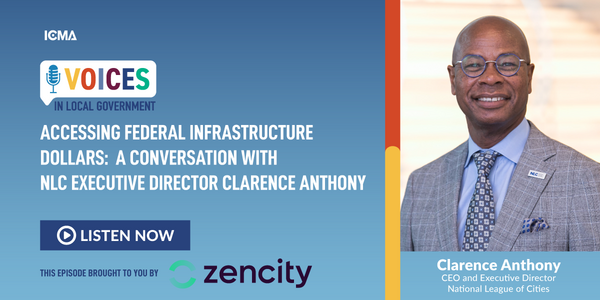
Small and mid-sized communities oftentimes do not have the resources and budget that large cities do, but their need for sound infrastructure is just as important. So, how can smaller communities compete against their larger counterparts for grant funding? With the help of the National League of Cities’ (NLC) Local Infrastructure Hub, small communities can get a leg up on the competition for those valuable grant dollars.
NLC’s Local Infrastructure Hub is a national program designed to connect communities with essential resources and expert guidance to help them access federal infrastructure funding, giving them the backing they need to drive local progress, improve communities, and deliver results for residents. During ICMA’s Voices in Local Government podcast, NLC CEO and executive director Clarence Anthony took the time to break down areas of opportunity within the new Bipartisan Infrastructure Law and how the Local Infrastructure Hub can help.
Anthony recognizes that submitting strong and compelling applications for federal infrastructure funding can come as a challenge for small and mid-sized communities, and that is why NLC, in tandem with the Local Infrastructure Hub, is offering a series of bootcamps that focus on five areas of grant writing opportunities: energy efficiency/conservation, electric vehicle charging infrastructure, roadway safety planning, roadway safety implementation, and brownfields cleanup. These bootcamps take the guesswork out of grant writing and open doors to new funding where your community needs it most, through access to templates, example submissions, and other resources that make for a robust application. Participants also gain support from subject matter experts, individualized coaching sessions, and peer-to-peer learning where they connect with a built-in community of like-minded leaders who are united in their fight for infrastructure progress.
Here are details on the five Local Infrastructure Hub bootcamps that are currently underway:
- Energy efficiency and conservation focuses on the Energy Efficiency and Conservation Block Grant Program, with 550 million grant dollars available. These grants are designed to help communities implement strategies to reduce fossil fuel emissions, implement renewable energy projects, and improve energy efficiency in various sectors.
- Electric vehicle charging infrastructure focuses on Charging and Fueling Infrastructure Grants, with 2.5 billion grant dollars available. These grants are designed to help communities address electric vehicle (EV) charging needs for a growing market of passenger vehicles and light duty trucks. Under the community charging program, $1.25 billion will be available for installing EV charging and alternative fuel in locations like public roads, schools, parks, and in publicly accessible parking facilities.
- Roadway safety planning focuses on the Safe Streets and Roads for All Grant Program, with 5 billion grant dollars available. Hundreds of action planning grants ranging from $200,000 to $5 million will be available for developing or updating a comprehensive safety action plan to prevent roadway deaths and serious injuries.
- Roadway safety implementation focuses on the Safe Streets and Roads for All Grant Program, with 5 billion grant dollars available. Up to 100 implementation grants ranging from $3 million to $30 million will be available for carrying out projects and strategies identified in an already established “action plan” to prevent roadway deaths and serious injuries.
- Brownfields cleanup focuses on brownfield grants, with 1.5 billion grant dollars available. The brownfields grant bootcamp will focus on communities seeking site assessment, cleanup, or multipurpose grants for brownfield sites.
Participating communities in Local Infrastructure Hub bootcamps will form a team composed of the manager and/or an elected official, a grant lead, a community engagement lead, and a finance lead. Depending on their assigned team role, team members can expect to set aside anywhere from two to ten hours per month, for three to four months, to complete the bootcamp.
Bootcamps are complimentary for communities selected to participate. If these sound like resources that your community can benefit from, the Local Infrastructure Hub has additional information and an FAQ section available to learn more. Or sign up for updates about future bootcamp topics and dates.
Check out ICMA’s Voices in Local Government Podcast to hear more from Anthony on the Local Infrastructure Hub, how local governments can harness the ability to bring about more equitable outcomes to their residents, and specific examples of communities that have reaped the benefits of these resources.

New, Reduced Membership Dues
A new, reduced dues rate is available for CAOs/ACAOs, along with additional discounts for those in smaller communities, has been implemented. Learn more and be sure to join or renew today!
